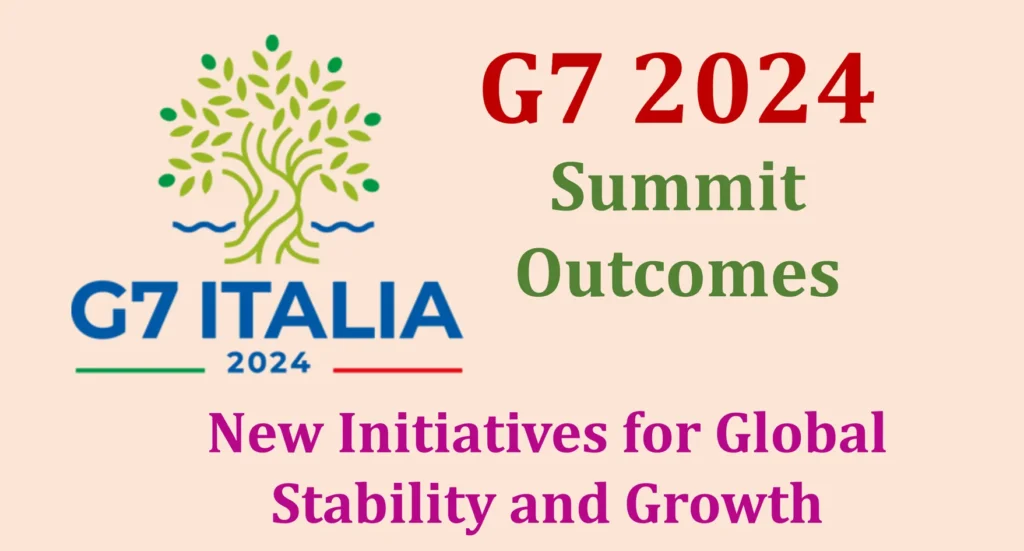
Introduction
Brief Overview of the G7 Summit
Before I start to list down the outcomes of G7 2024 summit, let’s learn about the G7 summit. The G7 Summit is an annual international forum where the leaders of seven of the world’s most advanced economies—France, the United States, the United Kingdom, Germany, Japan, Italy, and Canada—along with the European Union (EU), come together to discuss pressing global issues. Each year, the presidency of the G7 rotates among the member states, ensuring that all countries have an opportunity to host and set the agenda for the summit.
At the G7 Summit, leaders engage in open and candid discussions on a wide range of topics that are critical to the international community. These topics include the global economy, regional affairs, and various global issues such as climate change, health, and security. The summit provides a platform for these leaders to exchange views and formulate strategies to address these challenges. The outcomes of these discussions are typically documented in a communiqué, which outlines the collective decisions and commitments made during the summit.
The G7 is distinguished by its shared commitment to fundamental values such as freedom, democracy, and human rights. The leadership of the G7 countries has been instrumental in responding effectively to important challenges facing the international community, leveraging their collective influence to drive progress and stability.
History of the G7 Summit
The origins of the G7 Summit can be traced back to the early 1970s, a period marked by significant economic turmoil. Two major events underscored the need for a forum where the world’s leading economies could coordinate their policies: the Nixon shock in 1971 and the first oil crisis in 1973.
- Nixon Shock (1971): This term refers to the series of economic measures taken by U.S. President Richard Nixon in August 1971, which included unilaterally suspending the convertibility of the U.S. dollar into gold. This move effectively ended the Bretton Woods system of international financial exchange and led to a period of significant instability in the global currency markets.
- First Oil Crisis (1973): The 1973 oil crisis was triggered by the Organization of Arab Petroleum Exporting Countries (OAPEC) oil embargo, which targeted nations perceived as supporting Israel during the Yom Kippur War. The embargo led to skyrocketing oil prices and widespread economic disruption, highlighting the vulnerabilities of the global economy to energy supply shocks.
In response to these challenges, the leaders of the world’s major industrialized nations recognized the need for a platform to discuss and coordinate their macroeconomic policies. The initiative to create such a forum came from French President Valéry Giscard d’Estaing. Consequently, the first G7 Summit was held in November 1975 at the Château de Rambouillet, located on the outskirts of Paris. The inaugural summit brought together leaders from six countries: France, the United States, the United Kingdom, Germany, Japan, and Italy.
Since its inception, the G7 Summit has been held annually, with the presidency rotating among the member states. Over the years, the agenda of the G7 has expanded to include a broader range of issues beyond economic policy, reflecting the evolving challenges of the global landscape.
One significant development in the history of the G7 was the inclusion of Russia in 1998, expanding the group to the G8. But after annexing Crimea, Russia’s participation was terminated in March 2014, and the G7 resumed its previous structure. The G7’s dedication to preserving international law and its tenets of freedom, democracy, and human rights was emphasized by this resolution.
Overview of the G7 2024 Summit
Host and Location
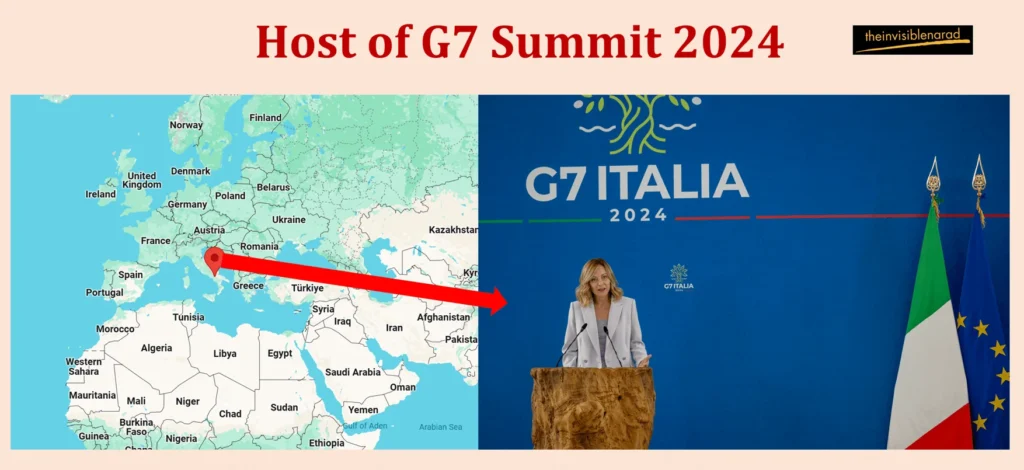
The 50th G7 Summit was hosted by Italy from June 13 to June 15, 2024. The event took place in Apulia, a region known for its picturesque landscapes and rich cultural heritage. This summit marked a significant milestone as it was the first major international forum hosted by Italian Prime Minister Giorgia Meloni since she assumed office in October 2022.

Theme: “Rules-Based International System”
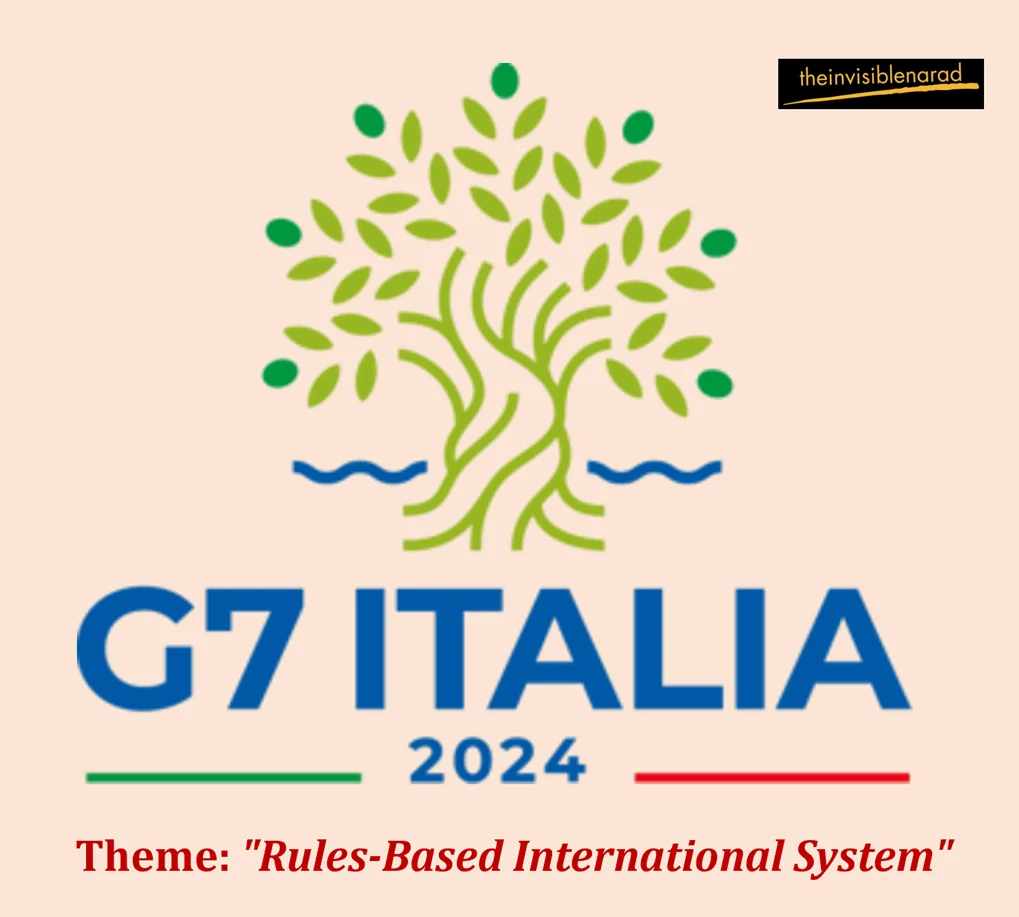
The central theme of the 2024 G7 Summit was the “rules-based international system.” This theme reflected the commitment of the G7 nations to uphold and strengthen international laws and norms that govern global interactions. The emphasis was on promoting a stable, fair, and predictable international order, essential for addressing complex global challenges such as conflicts, economic instability, and human rights issues.
Emblem of the G7 Summit
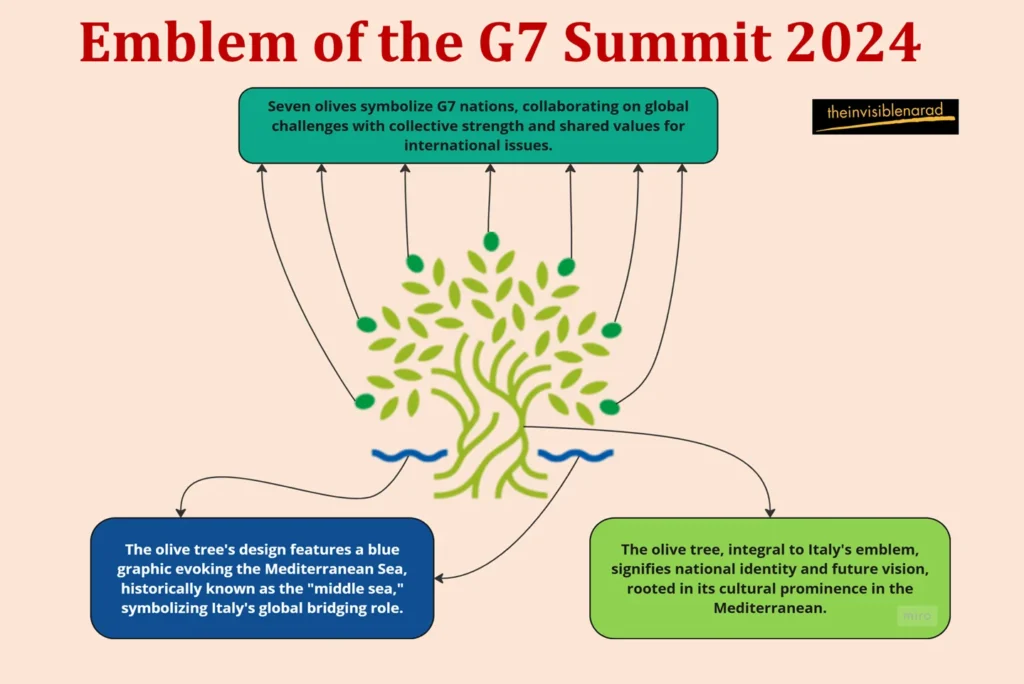
- Symbolism of the Olive Tree: The emblem of the G7 Summit features an olive tree, symbolizing strength and endurance with its sturdy roots, rugged trunk, lush foliage, and olives. This motif is not only a representation of natural resilience but also holds significant cultural and national symbolism for the Italian Republic.
- National Identity and Future Projection: The olive tree is a central element in the Italian Republic’s emblem, reflecting its national identity and aspirations for the future. It embodies the values of growth, sustainability, and continuity, essential for navigating global challenges and fostering international cooperation.
- Blue Graphics Symbol: Across the olive tree, there is a blue graphics symbol reminiscent of the Mediterranean Sea. Known historically as the “middle sea,” the Mediterranean holds cultural and geographical significance as a connector between the Atlantic and Indo-Pacific regions. This symbolizes Italy’s pivotal role in bridging diverse maritime spaces and fostering global dialogue.
- Representation of G7 Nations: The olive tree’s branches bear seven olives, each symbolizing a member nation of the G7. These countries collaborate on global challenges, utilizing their collective strength and shared values to address pressing issues affecting the international community.
Notable Attendees
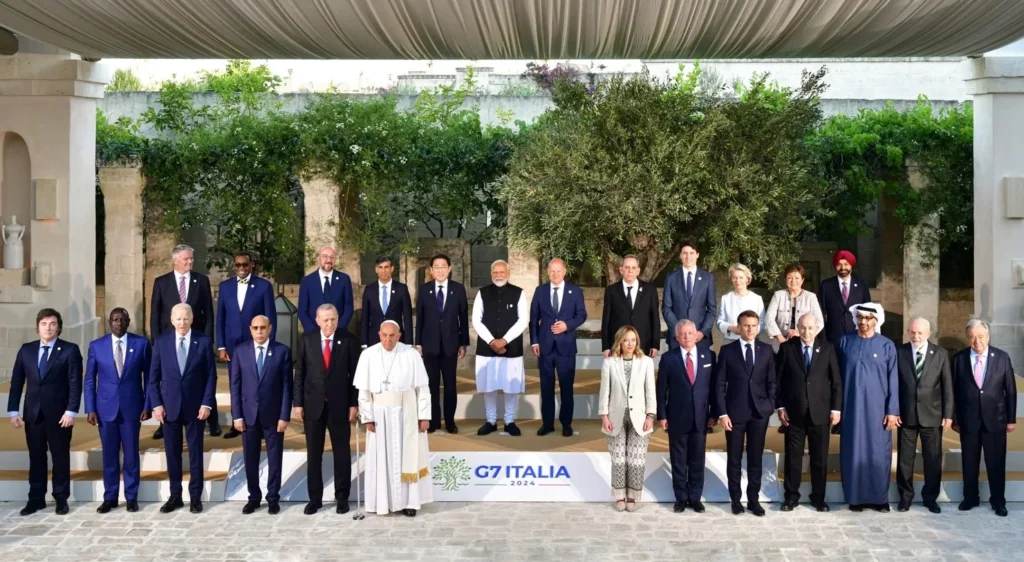
In addition to the G7 member countries (Canada, France, Germany, Italy, Japan, the United Kingdom, and the United States), the 2024 summit saw participation from several notable international leaders and dignitaries. Italian Prime Minister Giorgia Meloni extended invitations to several African leaders, including Algerian President Abdelmadjid Tebboune, Kenyan President William Ruto, and Tunisian President Kais Saied. This was part of Italy’s initiative to focus on development and migration issues in Africa.
Other prominent attendees included Ukrainian President Volodymyr Zelenskyy, Brazilian President Luiz Inácio Lula da Silva, Prime Minister of India Narendra Modi, and Turkish President Recep Tayyip Erdogan. Their presence underscored the global significance of the summit and the diverse range of issues discussed.
A historic highlight of the summit was the participation of Pope Francis, who became the first Pontiff to engage in the G7 proceedings. This unprecedented involvement highlighted the moral and ethical dimensions of the global challenges addressed at the summit. The summit also welcomed leaders and representatives from the European Union, including European Commission President Ursula von der Leyen, and other distinguished guests such as the King of Jordan.
Key Focus Areas and Outcomes
Supporting Ukraine
The 2024 G7 Summit placed a significant emphasis on supporting Ukraine amidst its ongoing conflict with Russia. The G7 leaders announced a substantial financial aid package, committing $50 billion in new financing for Ukraine. This financial assistance was made possible by advancing the interest earned on immobilized Russian sovereign assets held within the European Union and other jurisdictions.
In addition to financial support, a landmark U.S.-Ukraine Bilateral Security Agreement was signed by President Joe Biden and President Volodymyr Zelensky. This agreement underscored the enduring support of the United States for Ukraine, including binding commitments to deepen security and defense cooperation. The summit also saw the introduction of new sanctions and export control measures by the Biden Administration, aimed at intensifying the pressure on Russia for its aggressive actions in Ukraine.
International Peace, Security, and Prosperity
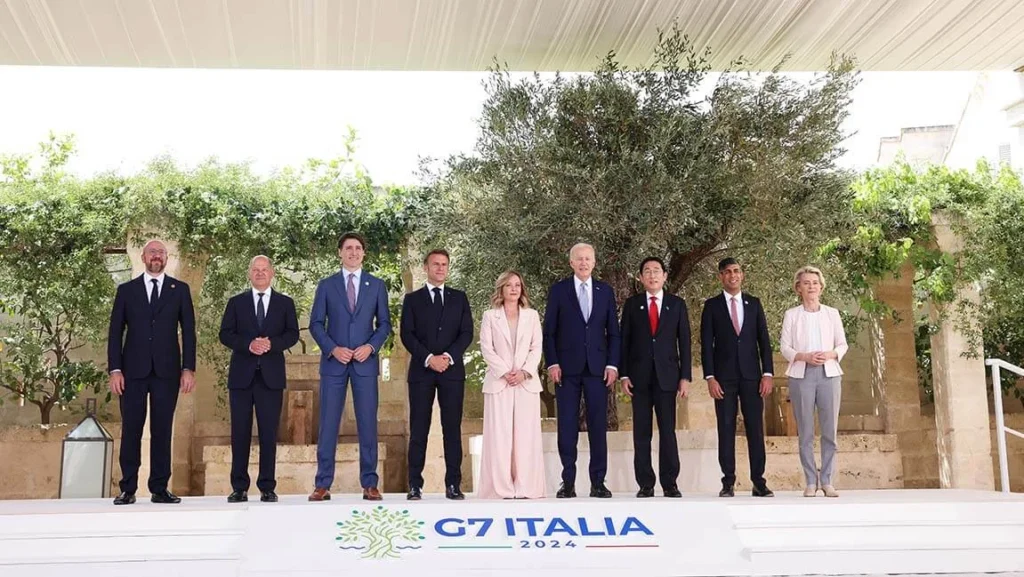
The G7’s commitment to promoting international peace, security, and prosperity was reaffirmed during the summit. The leaders emphasized their dedication to respecting the UN Charter and upholding a free and open rules-based international order. A significant outcome of the summit was the endorsement of a deal proposed by President Biden, which aimed at achieving an immediate ceasefire in Gaza. The G7 leaders also called for a substantial increase in humanitarian assistance to support those affected by the conflict in the Middle East.
Economic Resilience and Security
Economic resilience and security were key topics at the summit, with a focus on protecting workers, industries, and investments. The G7 leaders discussed measures to enhance the economic stability of their countries and reduce vulnerabilities in critical sectors. There was a strong emphasis on building resilient economies by reducing supply chain dependencies, particularly in vital industries such as solar and wind energy, electric vehicles, and steel and aluminum production.
Collaboration with developing countries was another important aspect, aiming to boost sustainable development and integrate these nations more effectively into the global economy. The summit addressed the challenges and opportunities associated with migration, highlighting the need to manage migration flows effectively while tackling the root causes of irregular migration, such as economic hardship and political instability.
Clean Energy Transition and Climate Change
The G7 leaders committed to accelerating efforts to combat climate change and transition to clean energy. Discussions focused on phasing out unabated coal power generation by the first half of the 2030s and promoting renewable energy sources. The summit highlighted the potential of nuclear and fusion energy as zero-emission energy sources, emphasizing their role in achieving net-zero emissions by 2050.
The leaders reiterated their commitment to keeping global temperature rise within the 1.5°C limit, as agreed upon in international climate agreements. They also focused on building clean and resilient supply chains to support the global energy transition, recognizing the importance of sustainable and inclusive economic growth in addressing climate change.
Health and Food Security
Health and food security were prominent on the G7 agenda, with the launch of the Apulia Food Systems Initiative. Named after the region hosting the summit, this initiative aimed to overcome structural barriers to food security and build resilient and sustainable agricultural systems. The G7 leaders emphasized the need to enhance the sustainability and productivity of local, regional, and global food supply chains.
In the health sector, leaders committed to taking action on antimicrobial resistance (AMR), including plans for a high-level meeting on AMR at the United Nations General Assembly later in the year. They also discussed measures to transform global health security financing and expand immunization coverage through sustainable replenishment of Gavi, the Vaccine Alliance.
Development and Partnerships
The G7 leaders focused on supporting developing countries in achieving the United Nations’ Sustainable Development Goals (SDGs). They committed to working with international organizations, such as the International Monetary Fund (IMF) and the World Bank, to help these countries tackle mounting debt burdens that hinder their progress on SDGs.
A key initiative launched at the summit was the Energy for Growth in Africa initiative. This partnership with African nations aimed to develop adequate clean energy infrastructure and supply chains on the continent, promoting sustainable development and local value creation.
Artificial Intelligence
Artificial intelligence (AI) was a major topic at the summit, particularly due to the participation of Pope Francis, who highlighted the ethical implications of AI. The G7 leaders recognized AI as an “epochal transformation” for humanity, emphasizing the need for close oversight to ensure that AI technologies are developed and used in ways that preserve human life and dignity.
The G7 affirmed the importance of creating international partnerships to ensure the benefits of AI are widely shared while mitigating its risks. Leaders agreed to launch an action plan for using AI in the workplace and to enhance coordination towards a shared understanding of AI risk management. They also emphasized the crucial role of resilient semiconductor supply chains in supporting safe, secure, and trustworthy AI development.
Special Highlights of the 2024 G7 Summit
Historic Participation of Pope Francis
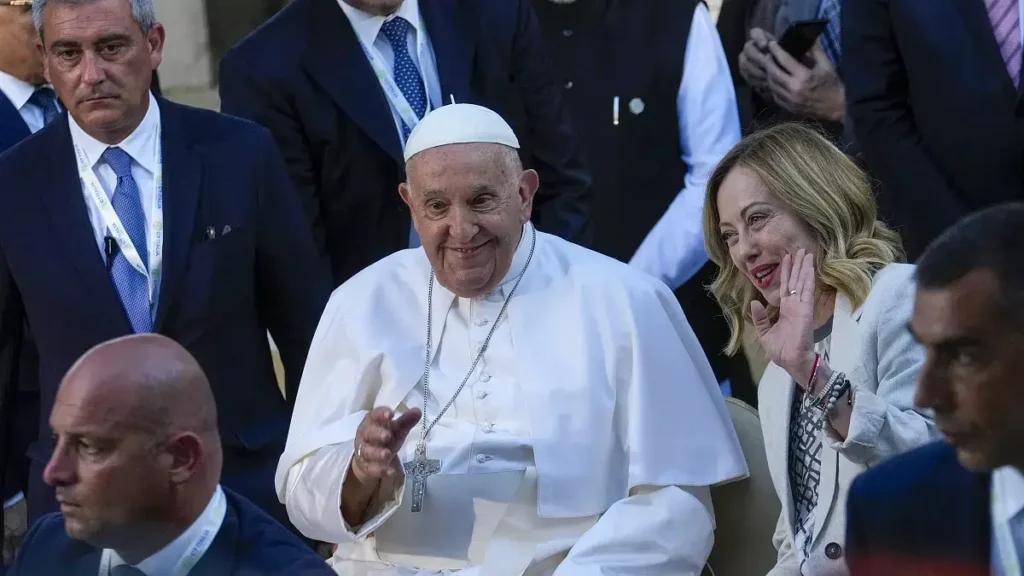
One of the most remarkable aspects of the 2024 G7 Summit was the historic participation of Pope Francis, marking the first time a Pontiff attended the summit. Italian Premier Giorgia Meloni extended the invitation, recognizing the significant impact of Pope Francis’s moral authority and global influence. The Pope’s presence brought a unique ethical perspective to the discussions, particularly concerning the development and use of artificial intelligence (AI).
Pope Francis addressed the leaders of the world’s wealthy democracies, urging them to prioritize human dignity in the development and application of AI. He warned that without proper oversight, AI could reduce human relations to mere algorithms and strip individuals of their autonomy. His message emphasized that decisions, especially those involving life and death, must always remain in human hands, not machines.
Francis called on political leaders to ensure that AI development remains human-centric and ethically guided. He reiterated the need for international regulations to prevent the misuse of AI and to ban lethal autonomous weapons, colloquially known as “killer robots.” His speech underscored the importance of preserving human control over AI decisions, as human dignity itself depends on it.
The Pope’s participation added a powerful ethical dimension to the summit, reminding leaders of their responsibility to create conditions for the ethical use of AI. His presence and words left a profound impact, as the room fell silent in awe when he arrived, highlighting the significant moral weight he carried into the discussions.
Emphasis on Resilient Semiconductor Supply Chains
Leaders from the Group of Seven planned to announce the creation of a group dedicated to coordinating the semiconductor supply chain, essential to the global economy. This new point-of-contact group aimed to also oversee subsea cable connectivity, ensuring security and resilience for the lines connecting countries to the Internet, according to a draft statement obtained by Bloomberg. The G7 leaders convened this week in southern Italy.
This semiconductor group represented the latest in a series of initiatives designed to secure global access to chips, which are crucial for everything from cars to smartphones, PCs to home appliances. The disruptions in supply chains and misjudged demand during the Covid-19 pandemic had led to significant shortages, prompting this coordinated response.
With the rapid growth of artificial intelligence programs, demand for semiconductors was expected to increase significantly. Additionally, access to this technology had become a focal point in the trade war with China. Both Europe and the US were striving to secure domestic production capabilities, while Beijing was working to enhance its own semiconductor production despite trade restrictions limiting its access to certain technologies.
The focus on subsea cable infrastructure arose after multiple outages highlighted the challenges in protecting and maintaining these critical lines. For instance, repairs to cables damaged in the Red Sea in February faced months of delay due to disputes over control of infrastructure in Yemeni waters. Even in the absence of territorial disputes, repairs often took months due to a shortage of repair ships and the inherent difficulties in accessing the underwater lines.
Addressing Irregular Migration and Organized Crime
Migration, particularly irregular migration, and organized crime were key themes at the 2024 G7 Summit. Italy, being on the frontlines of migration routes into the European Union, brought this issue to the forefront of the discussions. Leaders examined ways to address the root causes of irregular migration, such as economic hardship, conflict, and political instability, which drive people to flee their home countries.
The G7 leaders discussed strategies to enhance border management and combat organized crime and human smuggling networks that exploit vulnerable migrants. They emphasized the importance of international cooperation in tackling these challenges and creating sustainable solutions to manage migration flows effectively.
The summit underscored the need for comprehensive approaches that address both the immediate and underlying factors contributing to irregular migration. This included fostering economic development in migrants’ home countries, improving legal migration pathways, and ensuring humane and effective border management practices.
The leaders also reflected on the broader implications of migration for global security and economic stability. They recognized that well-managed migration could offer opportunities for growth and development, while poorly managed migration could exacerbate security challenges and social tensions.
The 2024 G7 Summit in Italy was marked by significant discussions and decisions on critical global issues, including the ethical use of AI, the resilience of semiconductor supply chains, and the management of migration and organized crime. The historic participation of Pope Francis added a profound ethical perspective to the summit, emphasizing the importance of human dignity in technological advancements. The commitments made by the G7 leaders at the summit aimed to address these complex challenges through international cooperation and shared responsibility.
Conclusion & FAQs
The 2024 G7 Summit, held in Apulia, Italy, marked a pivotal moment in international cooperation, addressing a wide range of pressing global issues. This summit underscored the collective resolve of the world’s leading democracies to foster a rules-based international system. Notably, it focused on supporting Ukraine amidst its ongoing conflict with Russia, advancing international peace and security, promoting economic resilience, accelerating the clean energy transition, and addressing health and food security.
The historic participation of Pope Francis added a profound ethical dimension to the discussions on artificial intelligence, emphasizing the need for human-centric AI development. The summit also highlighted the critical importance of resilient semiconductor supply chains and the security of subsea cable infrastructure, both vital to maintaining global connectivity and technological advancement.
The G7 leaders committed to substantial financial support for Ukraine, enhancing humanitarian aid, and taking decisive actions against climate change. They also launched initiatives to boost sustainable development in developing countries and address migration challenges comprehensively. The establishment of the Apulia Food Systems Initiative and measures to combat antimicrobial resistance further demonstrated the G7’s dedication to global health and food security.
Overall, the 2024 G7 Summit reaffirmed the importance of international collaboration and ethical governance in addressing the multifaceted challenges of our time. The commitments and initiatives launched at this summit are poised to have a lasting impact on global stability, economic growth, and technological advancement.
Frequently Asked Questions (FAQs)
What was the main theme of the 2024 G7 Summit?
The main theme of the 2024 G7 Summit was the “rules-based international system,” focusing on promoting a stable and fair global order.
Which new initiatives were introduced at the 2024 G7 Summit?
New initiatives included the U.S.-Ukraine Bilateral Security Agreement, the Apulia Food Systems Initiative, and the establishment of a point-of-contact group for semiconductor supply chains and subsea cable connectivity.
What role did Pope Francis play at the 2024 G7 Summit?
Pope Francis participated for the first time, offering ethical guidance on the development and use of artificial intelligence, emphasizing the need for human-centric AI and ethical oversight.
How did the G7 leaders address the issue of climate change?
The G7 leaders committed to phasing out coal power generation, promoting renewable energy, and emphasizing the potential of nuclear and fusion energy to achieve net-zero emissions by 2050.
What measures were taken to support Ukraine?
The G7 leaders announced $50 billion in new financing for Ukraine, signed a security agreement between the U.S. and Ukraine, and imposed new sanctions on Russia.
What was discussed regarding economic security?
Discussions focused on protecting workers, industries, and investments, reducing supply chain dependencies, and building resilient economies while promoting global trade and partnerships with developing countries.
